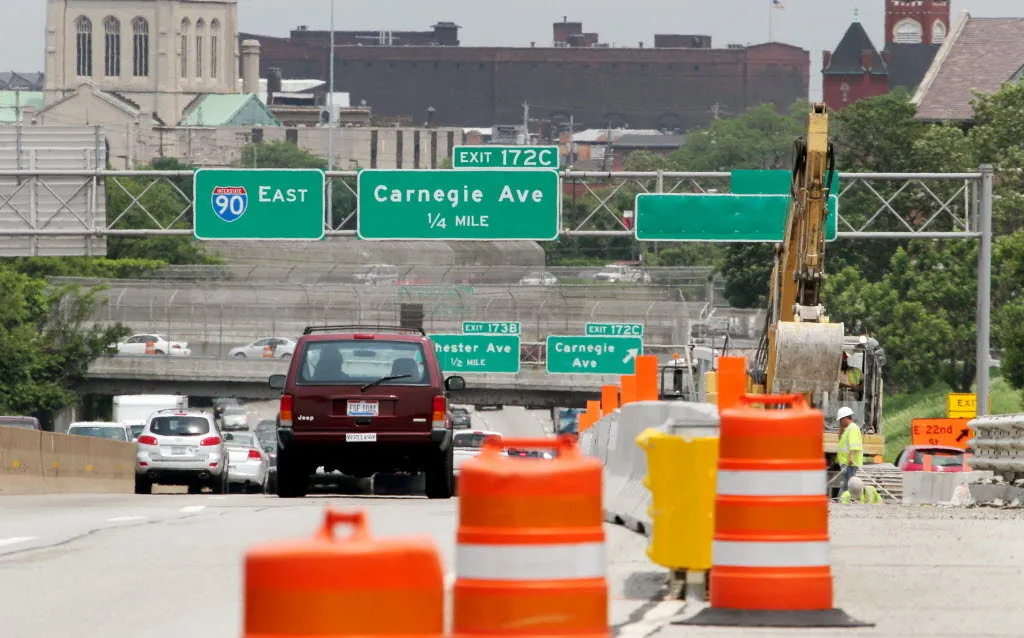Along Carnegie Avenue, this artery pulsating right in the heart of industrial Cleveland, orange barrels and construction cones have become a symbol not only of progress but also of quiet economic catastrophe. For local entrepreneurs like Lenny Weis, co-owner of the Bee Clean Car Wash, which has endured nearly six decades of economic storms—from the stagflation of the 1970s to the recession of 2008—the current street reconstruction has become the most serious threat. “Winter is coming soon,” Weis says with a note of despair I’ve heard from many small business owners in similar situations across the country. “I don’t know if we can hold on another year without our business.” His words echo a broader reality: while federal investments in infrastructure, such as the Infrastructure Investment and Jobs Act, promise long-term revival for cities like Cleveland, short-term sacrifices often fall on the shoulders of those who can least afford it.
Since February of this year, Weis and other business owners along Carnegie Avenue — from East 55th to East 79th Streets — have sounded the alarm about the reconstruction project that has transformed this lively thoroughfare into a labyrinth of detours and obstacles. The project, part of the ambitious “re-inCarnegie” plan by MidTown Cleveland, aims to modernize the road, improve pedestrian access, and integrate with public transportation — initiatives that, according to insider assessments from the Ohio Department of Transportation, could boost the local economy by millions of dollars in the long run. But for Weis, the reality is different: customers simply cannot reach his location. The situation worsened sharply when construction shifted from the south side of the road to the north, blocking access points and creating chaos reminiscent of similar projects in Detroit or Philadelphia, where small businesses lost up to 30% of income due to temporary inconveniences.
To understand the depth of the problem, I joined Weis and reporter Caitlin Hunt from the local News 5 during a tour of the area — and what we saw was a compelling testament to bureaucratic indifference. Starting at the intersection of East 55th and Carnegie, we immediately encountered a rerouting that made us circle around the detour signs, which led back to the same row of orange cones. At East 79th, the situation grew even more confusing: a traffic light without clear instructions forced us to turn onto Cedar Avenue, relying solely on Weis’s local knowledge to get back to the car wash. “Many customers, when they arrive, say, ‘Oh my God! It was hard to get here,’” Weis shared, and his words are supported by data: according to the American Small Business Association, similar construction projects can lead to a loss of 20-50% of clientele, especially in low-traffic areas.
Weis is convinced that the root of the problem lies in the lack of adequate signage. “We need more signs indicating how customers can reach the businesses, where obstacles are located, and how to avoid them,” he emphasizes. Hunt relayed these concerns to the Cleveland city authorities, and the response came via email — a typical bureaucratic reaction I have seen in many municipalities. The city stated that one of the detours we encountered would be reopened as a two-way route a few days after asphalt paving, using faster-drying materials to expedite works and maintain access to businesses. “Due to the nature of these works, road construction sometimes causes inconvenience to passengers and to the businesses on Carnegie,” officials acknowledged, adding that they are doing everything possible to reduce issues. However, when asked about additional assistance — such as opening alternative routes or installing more signs — the response was evasive, without concrete promises. This is not surprising: according to my sources in city planning departments, budgets for such projects often do not include compensation for businesses, despite federal recommendations.
Relief may not come soon for Weis. Right across from the Bee Clean Car Wash, between East 79th Street and Martin Luther King Drive, signs of the second phase of the project have already appeared, according to official city data, which began in July 2025 and is scheduled to be completed by November 2026. This phase, a continuation of the work started back in 2023, promises to transform Carnegie into a modern urban street, but for small businesses, it means another year and a half of uncertainty. In the context of Cleveland’s broader revival — from the reconstruction of I-90 to the development of MidTown — stories like Weis’s serve as a reminder of the cost of progress. Will the city manage to find a balance between ambitious plans and safeguarding the local economy? For now, the orange barrels stand firm, and businesses battle for survival, hoping for better days ahead.


